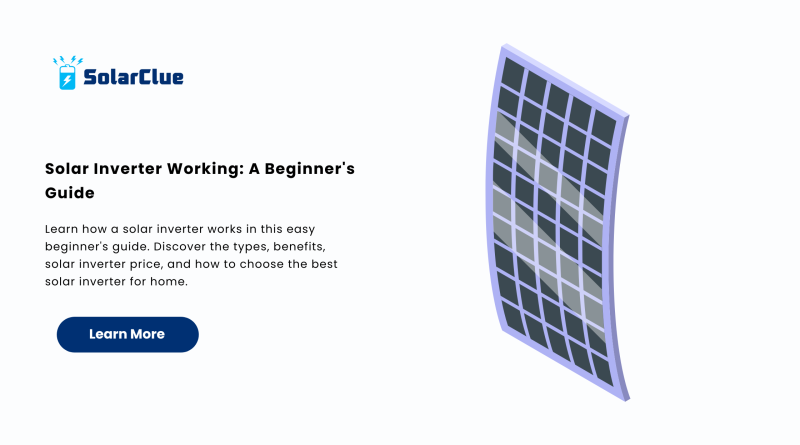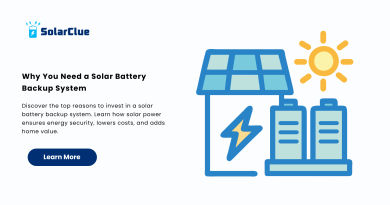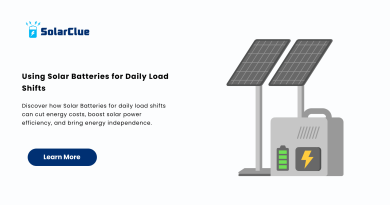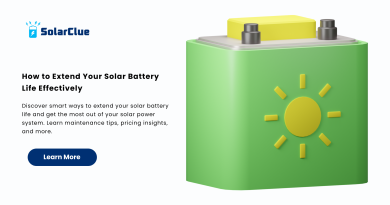Solar Inverter Working: A Beginner’s Guide
In recent years, the use of solar energy has skyrocketed as people shift toward greener and more sustainable solutions. Among the crucial components of any solar power system, the solar inverter plays a vital role. Whether you’re installing a solar inverter for home or for commercial use, understanding how it works is essential. In this beginner-friendly guide, we’ll explain everything about solar inverters, including types, functions, prices, and how to choose the best solar inverter for your needs.
Table of Contents
- 1 What is a Solar Inverter?
- 2 Why is a Solar Inverter Important?
- 3 How Does a Solar Inverter Work?
- 4 Types of Solar Inverters
- 5 Key Features to Look for in a Solar Inverter
- 6 Solar Inverter for Home Use
- 7 Solar Inverter Price Breakdown
- 8 Installation and Maintenance Tips
- 9 Benefits of Using a Solar Inverter
- 10 Common Issues and Troubleshooting
- 11 Solar Inverter and Net Metering
- 12 Latest Trends in Solar Inverter Technology
- 13 How to Choose the Best Solar Inverter for Your Needs
- 14 Conclusion
- 15 Frequently Asked Questions
What is a Solar Inverter?
A solar inverter is an essential component in any solar power system. It converts the direct current (DC) electricity generated by solar panels into alternating current (AC) electricity, which is used by most household appliances. Without a solar inverter, the electricity generated from solar panels would be practically unusable for everyday tasks.
Why is a Solar Inverter Important?
The solar inverter ensures the smooth and safe operation of your solar energy system. It not only handles the conversion of power but also monitors the system’s performance, maximizes energy efficiency, and provides protection from electrical faults.
How Does a Solar Inverter Work?
Here’s a simplified step-by-step explanation of how a solar inverter works:
- DC Generation: Solar panels absorb sunlight and convert it into DC electricity.
- Inverter Conversion: The solar inverter takes this DC electricity and converts it into AC electricity.
- Power Distribution: The AC electricity is then supplied to your home appliances or fed into the grid.
- Monitoring: Modern solar inverters also track the energy produced and can alert you to any issues.
Types of Solar Inverters
Choosing the best solar inverter involves understanding the different types available:
String Inverters
- Most commonly used
- Cost-effective
- Ideal for homes with minimal shading
Microinverters
- Installed on each solar panel
- Better for shaded roofs
- Slightly higher solar inverter price
Hybrid Inverters
- Combine battery storage
- Great for backup power
- Efficient and flexible
Central Inverters
- Used in large-scale commercial systems
- Not suitable for residential use
Key Features to Look for in a Solar Inverter
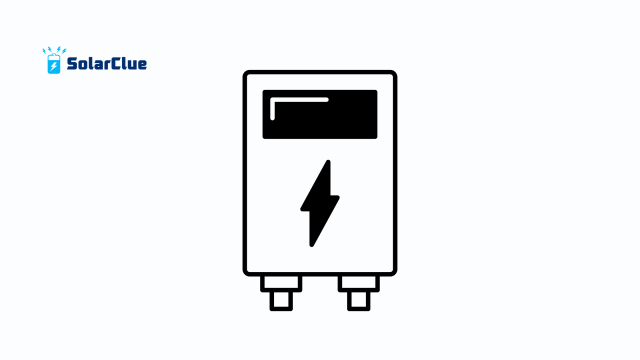
When searching for the best solar inverter, consider these features:
- High efficiency rating (90% or more)
- Durability and long warranty
- Smart monitoring systems
- Compatible with your existing solar panels and battery systems
Solar Inverter for Home Use
Installing a solar inverter for home can significantly reduce your energy bills and reliance on the grid. Homeowners typically use string or hybrid inverters based on their setup and energy needs.
Solar Inverter Price Breakdown
The solar inverter price depends on:
- Type (micro, string, hybrid, etc.)
- Power rating (in kW)
- Brand and warranty
- Installation costs
On average, the solar inverter price in India ranges from ₹7,000 to ₹80,000 depending on capacity and features.
Installation and Maintenance Tips
- Hire certified professionals for installation
- Keep the inverter in a shaded, ventilated area
- Regularly clean and check connections
- Use app-based monitoring for performance tracking
Benefits of Using a Solar Inverter
- Efficient energy use
- Reduced electricity bills
- Lower carbon footprint
- Government subsidies and tax benefits
Common Issues and Troubleshooting
- Overheating: Ensure proper ventilation
- Low Efficiency: Might need an upgrade or servicing
- Connectivity Problems: Restart and check firmware updates
Solar Inverter and Net Metering
Most grid-tied solar systems come with net metering options. A good solar inverter facilitates this by tracking the energy sent to and from the grid, helping you earn credits on your energy bills.
Latest Trends in Solar Inverter Technology
- AI-based performance analytics
- Voice-controlled smart inverters
- Integration with home automation systems
- Remote diagnostics and firmware updates
How to Choose the Best Solar Inverter for Your Needs
- Assess your energy usage
- Consider roof size and solar exposure
- Match inverter capacity with solar panel output
- Compare brands and customer reviews
Conclusion
A solar inverter is the heart of your solar power system. Understanding its functions and features can help you make informed decisions, whether you’re planning to buy a solar inverter for home or upgrade an existing setup. With the right choice, you can maximize your energy efficiency and cost savings.
Visit our website for more helpful resources and the latest deals on solar products: solarclue.com and our blog at blog.solarclue.com — your solar journey starts here!
Frequently Asked Questions
1. What does a solar inverter do?
A solar inverter converts DC electricity from solar panels into AC electricity for home use.
2. How long do solar inverters last?
Typically, a solar inverter lasts between 10–15 years, depending on the brand and maintenance.
3. What is the average solar inverter price in India?
The solar inverter price varies from ₹7,000 to ₹80,000 based on capacity and type.
4. Which is the best solar inverter for home use?
Hybrid inverters are often considered the best solar inverter due to their efficiency and backup capabilities.
5. Can I install a solar inverter myself?
It is recommended to hire certified technicians to ensure safety and proper installation.

